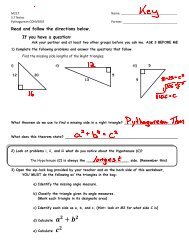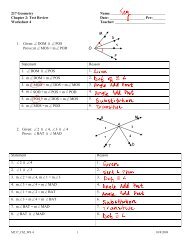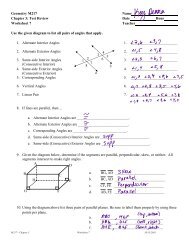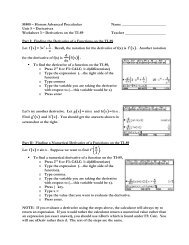Contracts PowerPoint
Contracts PowerPoint
Contracts PowerPoint
You also want an ePaper? Increase the reach of your titles
YUMPU automatically turns print PDFs into web optimized ePapers that Google loves.
<strong>Contracts</strong><br />
Chapter 6
<strong>Contracts</strong><br />
• Think about how many times we make promises<br />
that are legally binding? What excuses are<br />
acceptable for breaking those promises?<br />
▫ Sometimes promises create moral rather than<br />
legal obligations.<br />
Moral obligations do not create legal liability.<br />
▫ Dates are social agreements and are not<br />
enforceable.
Terms<br />
• Contract – legally enforceable agreement to do<br />
OR not to do something<br />
• Offeror – party who makes the offer<br />
• Offeree – party to whom an offer is made
• Contract law is necessary to allow the innocent<br />
party some form of legal remedy (compensation)<br />
▫ UCC is very important to contract law<br />
• Promise – something will/will not happen<br />
▫ Promisor – person making promise<br />
▫ Promisee – person to whom a promise is made
Requirements of a Contract:<br />
• Offer and Acceptance<br />
▫ serious offer to contract and be bound by the<br />
contract. Terms must be definite.<br />
• Consideration<br />
▫ Something of value received or promised<br />
• Legal Capacity<br />
▫ Competent parties<br />
• Legality<br />
▫ must be a legally binding contract<br />
• Genuine (Mutual) Assent<br />
▫ meeting of the minds<br />
• Proper Form<br />
▫ some agreements must be in writing
In Class Activity<br />
• Take out a piece of paper and work<br />
with your “shoulder partner”.<br />
• List the SIX requirements of a<br />
contract!
In Class Activity 2<br />
• You need to create 2 scenarios:<br />
▫ A legally binding contract (with the 6<br />
requirements)<br />
▫ A void/ non enforceable contract
Terms<br />
• Express – fully stated in words (oral or written)<br />
• Implied – implied from conduct of the parties<br />
• Quasi – protest an innocent party, obligation<br />
created by law<br />
▫ ATM machine example<br />
• Formal – requires special form – under seal<br />
• Informal – does not require special form; most<br />
contracts are informal
Terms<br />
Executed – contract that has been fully completed<br />
Executory – contract that has NOT been<br />
completed<br />
• Valid – includes all the essential elements –<br />
completely enforceable<br />
• Void – agreement that cannot be enforced;<br />
lacking an essential element
How is a Contact Not Enforceable?<br />
• Voidable – gives one party the right to cancel the<br />
contract without penalty<br />
▫ ratify – makes valid<br />
▫ voidable at the option of the injured party<br />
▫ mutual mistake, duress, undue influence, minors,<br />
mentally unstable, etc.<br />
• Unenforceable – valid contract but cannot be<br />
enforced because of some legal defense.
• Get into groups 4 groups<br />
• Draw a cartoon strip of one of the following<br />
words:<br />
▫ Bilateral Acceptance<br />
▫ Unilateral Acceptance<br />
▫ Voidable Contract<br />
▫ Unenforceable Contract
• Student Version: Different Types of <strong>Contracts</strong>
Offer and Acceptance
Offer<br />
• First step in a binding contract<br />
• Offer – promise by offeror to do something<br />
• Acceptance – agreement by offeree to do what was<br />
requested<br />
• Offers –<br />
▫ seriously intended – anger is not legally binding<br />
reasonable person standard<br />
advertisements – are NOT offers, only invitations to make an offer<br />
auctions - invitations to make an offer
Offer<br />
• Offers must be definite<br />
▫ clear and complete<br />
• Must be communicated<br />
▫ writing, orally, or by actions<br />
▫ rewards – is only payable if the offeree KNEW of it<br />
▫ not payable to people who already have a pre-existing duty (police<br />
officers)<br />
• Counteroffer – terminates original offer<br />
• Lapse of time terminates an offer (reasonable time)<br />
• Rejection terminates an offer – writing or words<br />
• Revocation – must be communicated<br />
• Option offers – contracts – keeping an offer open (real estate)<br />
• Death or insanity<br />
• Impossibility of performance
Minors and their contracts<br />
• Age of majority in most states is 18<br />
▫ 17 is a grey area though – be careful<br />
Minor can:<br />
accept (ratify)<br />
disaffirm (deny) a contract<br />
Disaffirmance can take place any time during<br />
minority or a reasonable time after reaching<br />
majority - timely
Minors<br />
• Minors must return goods they received if they<br />
disaffirm<br />
▫ duty of restoration<br />
▫ duty of restitution<br />
• If a minor is disaffirming, must disaffirm the<br />
entire contract
Minors<br />
• Misrepresentation of Age<br />
▫ just lying about age causes disaffirmance<br />
▫ some courts refuse to let minor disaffirm unless<br />
consideration is provided<br />
▫ can disaffirm but held liable for damages.<br />
Defrauded party can sue
Minors<br />
• Emancipation – release of minor by parents –<br />
complete surrender of rights<br />
▫ cancels parental obligations<br />
• Minors are liable for reasonable value of<br />
necessaries
Acceptance<br />
• must be accepted only by the offeree<br />
• agree with the offer<br />
▫ remember that in a unilateral contract, acceptance is the DOING<br />
of the act<br />
and offeror needs to be contacted that the act is completed –<br />
notification<br />
• acceptance must be done in the manner stipulated in the<br />
contract<br />
• silence does not constitute acceptance<br />
• mailbox rule – acceptance is effective when mailed<br />
(postmarked)<br />
• A letter of revocation is not effective until received
















